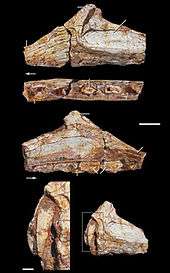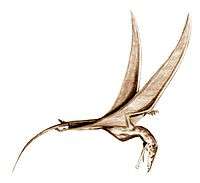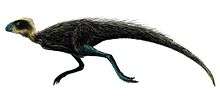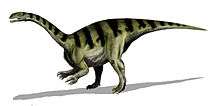Lepidus (dinosaur)
| Lepidus Temporal range: Upper Triassic, 223 Ma | |
|---|---|
 | |
| Holotype ankle | |
| Scientific classification | |
| Kingdom: | Animalia |
| Phylum: | Chordata |
| Class: | Reptilia |
| Clade: | Dinosauria |
| Order: | Saurischia |
| Suborder: | Theropoda |
| Superfamily: | †Coelophysoidea |
| Genus: | †Lepidus Nesbitt & Ezcurra, 2015[1] |
| Type species | |
| †Lepidus praecisio Nesbitt & Ezcurra, 2015[1] | |
Lepidus is a genus of extinct coelophysoidean theropod from the Upper Triassic of the United States. It lived in the Otis Chalk localities of the Dockum Group in Texas, around 223 million years ago.
Discovery

It was first described in 2015 by Nesbitt & Ezcurra, who decided it warranted a new taxon, which they named Lepidus praecisio.[1] The generic name is Latin for "fascinating", and the specific name is Latin for "fragment", or "scrap". The holotype material includes a tibia, astragalus, and fibula, and other referred material includes a femur and maxilla. The holotypic material is well preserved and shows signs of muscle scars. The astragalus and calcaneum are clearly fused into one bone, with no visible suture. The tibia resembles that of neotheropods, in overall morphology. The shape of the tibia resembles the same in Camposaurus, Coelophysis, Tawa hallae, Eodromaeus, and Herrerasaurus.
Lepidus was one of eighteen dinosaur taxa from 2015 to be described in open access or free-to-read journals.[2]
Classification

A phylogenetic analysis was conducted, including with and without referred material. The results are shown below:
| Neotheropoda |
| ||||||||||||||||||||||||||||||||||||||||||||||||||||||
| |
See also
References
- 1 2 3 Nesbitt, Sterling J.; Ezcurra, Martin D. (13 July 2015). "The early fossil record of dinosaurs in North America: A new neotheropod from the base of the Upper Triassic Dockum Group of Texas". Acta Palaeontologica Polonica. 60. doi:10.4202/app.00143.2014.
- ↑ "The Open Access Dinosaurs of 2015". PLOS Paleo.



